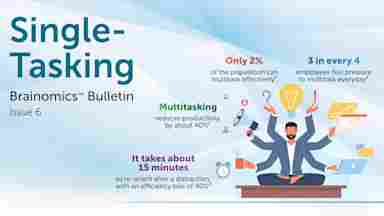Brainomics of Single-Tasking
Brainomics Issue 6 Open Printable PDFThe Brainomics® Venture is about understanding how brain health and brain performance translate into economic results, at the organizational and macro-levels. One emerging strong hypothesis is that organizations can improve their effectiveness and productivity if their people stop multitasking and get better at single-tasking. Multitasking is defined as attempting to simultaneously execute two (or more) tasks that require cognitive effort and have different goals. Neuroscience teaches us the brain cannot effectively do different complex cognitive tasks at the exact same time – instead, evidence overwhelmingly shows that when our brains “task-switch,” we gain errors and lose time.3The result is reduced productivity (40% according to one study4), work needing to be redone, and a drop in creativity.5 Yet, when we ask executives how many are trying to multitask, invariably almost every hand goes up.6 Those who lose the most from multitasking often think they are great at it. Are we ready to teach corporate America to single-task? The BrainHealth team is leading the way with our corporate partners. The early results are encouraging, and solid case studies should be coming soon. The great thing about single-tasking is that it can become intuitive through practice and does not require changes in corporate structure or new complex programs. When people learn a little about what is going on inside the brain during their attempts to multitask – and get guidance on single-tasking strategies – they quickly perceive the benefits for themselves. So single-tasking doesn't become a chore; it becomes a way of working and a way of life.
“”

- Martins, Julia. (2024). Multitasking Doesn’t Work — Here’s What Does. Asana.
- Atchley, Paul. (2010, December). You Can’t Multitask, So Stop Trying. Harvard Business Review.
- Bellur, S., Nowak, K. L., & Hull, K. S. (2015). Make It Our Time: In Class Multitaskers Have Lower Academic Performance. Computers in Human Behavior, 53, 63–70. https://doi.org/10.1016/j.chb.2015.06.027
- American Psychological Association. (n.d.). Multitasking: Switching Costs. APA.
- Cherry, Kendra. (2023, March 1). How Multitasking Affects Productivity and Brain Health. Verywell Mind.
- MacKay, J. (2018, June 15). The True Cost of Email and IM. RescueTime Blog.




